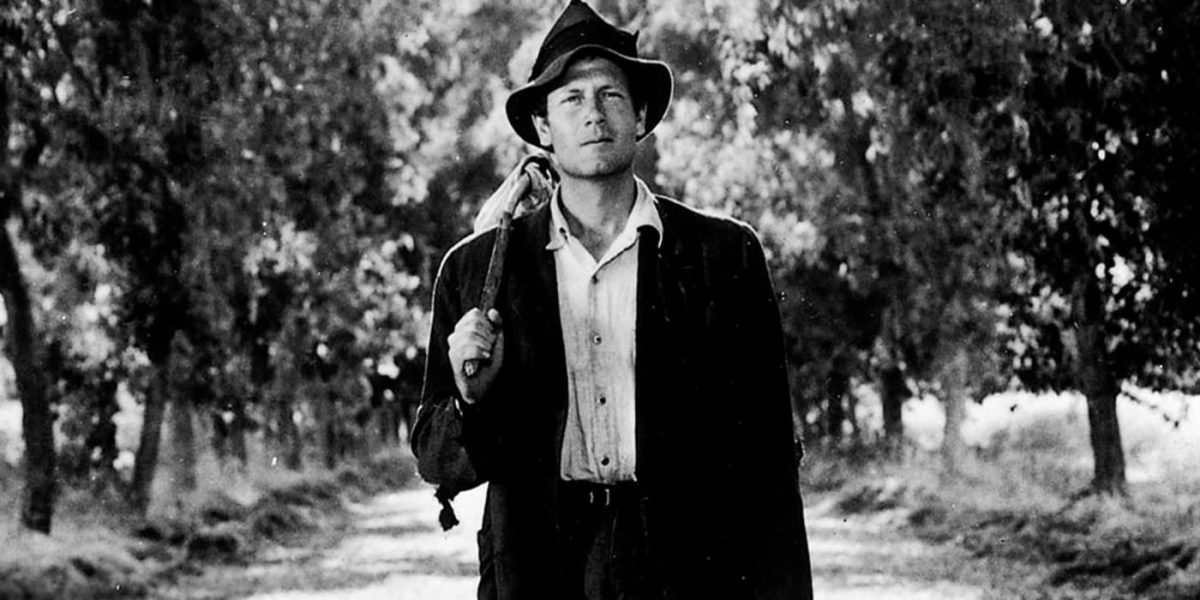
Without This Classic Comedy, a Beloved Coen Brothers Film Wouldn’t Exist
Sep 3, 2024
Only Joel and Ethan Coen would use a fake movie within the story of a screwball comedy from 1941 as the namesake for their 2000 adaptation of Homer’s Odyssey, a movie that would go on to win the Grammy for Album of the Year. The Coen Brothers share an eclectic brain, but their work is always intelligent, humorous, and wholly entertaining, nonetheless. Many of their choices seem baffling on paper, but they’re executed with such nuance and precision time and time again. O Brother, Where Art Thou?, is one of the most beloved Coen Brothers films, as it exemplifies their unique eye for manipulating cinematic conventions. However, their style of crossing high and low-brow humor with a touch of show-business satire would be nowhere without the work of director Preston Sturges, whose screwball comedy/Hollywood satire, Sullivan’s Travels, not only inspired the Coens’ Depression-era Odyssey but the vast scope of their filmography.
Preston Sturges’ Mastery of Screwball Comedies and Bumbling Characters
Image via Universal Pictures
Preston Sturges, a playwright and screenwriter-director of classic Hollywood, rarely receives proper adoration from a mainstream audience relative to the other legendary directors of the period. His filmography in the 1940s stacks up against the best, including John Ford, Orson Welles, and Billy Wilder. Recognized as the first screenwriter to graduate to director, Sturges was a quintessential author of the screwball comedy genre, who used the mold to satirize the upper class and show business. In 1941, a watershed year for cinema that included Citizen Kane, Sturges wrote and directed two of the most ingenious comedies in history: The Lady Eve, starring Barbara Stanwyck and Henry Fonda, and Sullivan’s Travels, an essential text for the subgenre of Hollywood-based satires.
In the groundbreaking book, The American Cinema, on auteurism and the role of the film director, Andrew Sarris wrote that Sturges’ films “repeatedly suggested that the lowliest boob could rise to the top with the right degree of luck, bluff, and fraud.” This adage could apply to the work of the Coen Brothers, who are often cited as directors who hate their characters due to their sardonic wit. Films of theirs, such as Intolerable Cruelty and Hail, Caesar!, are stylistically modeled after Sturges’ films. Across their diverse filmography, ranging from grim noirs to pastiche screwball comedies, the Coens’ dialogue has a bumbling eloquence. Their characters are often buffoons, but they express themselves with such conviction that they pose as off-kilter intellects. The merging of highbrow, literary dialogue and low-brow slapstick was first practiced by Sturges in the 1940s.
‘Sullivan’s Travels’ Satirizes the Vanity of Hollywood and Moviemaking
The Coen Brothers, who made their own show business satire in Barton Fink, were heavily inspired by Sullivan’s Travels. Sturges’ film follows Hollywood director, John L. Sullivan (Joel McCrea), a comedy director of low-brow popcorn entertainment. He sets out to make a prestigious “message” picture about homeless people in America. To obtain authentic life experience, Sullivan, like a method actor preparing for a role, lives as a penniless nomad with the downtrodden people he’s looking to portray onscreen. While on his journey, Sullivan links up with an aspiring but struggling actress, anonymously named The Girl (Veronica Lake). As he becomes immersed in life as a homeless person, he runs into unforeseen difficulties trying to restore his true identity. His passion project is based on a fictional book entitled “O Brother, Where Art Thou?” Nearly 60 years later, Joel Coen jokingly remarked on Charlie Rose’s show, “We went ahead and made it for him.”
The satirical commentary of Sullivan’s Travels prevails throughout contemporary film culture. The self-consciousness of an “unsophisticated” filmmaker like Sullivan reflects directors who helm franchise/IP blockbusters and crave the itch to make something uber-serious, as seen with the Russo Brothers following up Avengers: Endgame with the PTSD psychological drama, Cherry. Who knows, maybe Adam McKay, who struck comedic gold with Anchorman and Step Brothers, only to make a hard pivot into didactic, politically-conscious dramedies, found John Sullivan to be inspirational. Sullivan, a well-meaning and dedicated artist, speaks to the vanity and self-importance that Hollywood figures carry themselves with.
Whenever they are prompted to realize the plight of lower-class people on the screen, more often than not, it is a patronizing depiction. Sullivan has a privileged perspective on what it means to be homeless, as he quickly learns that a nomadic life is far harsher than any big-screen fantasy. After being knocked out and robbed at a train yard, Sullivan loses his identity, and his lack of communication from the outside world leads the press to conclude that he is dead. His stunt spotlights Hollywood’s exploitative tendencies, as the studio gets a kick out of publicizing Sullivan. The director looking to exploit lower-class society for his self-interest, and Hollywood exploiting Sullivan for their self-interest, shows that the industry is just a snake constantly eating its own tail.
Image via Paramount Pictures
Despite the pressing satirical nature of his films, Preston Sturges’ films have a heart of gold. In Sullivan’s Travels, he deploys satire to mock the hubris of a desperate filmmaker posing as an “artist” and pay homage to the genre that brought him critical acclaim. Towards the end of the film, Sullivan begins regaining his memory after being hit in the head with a rock and sentenced to a labor camp. While there, he attends a screening of the Walt Disney cartoon, Playful Pluto, where the audience of lowly prisoners laugh hysterically. In a stunning twist, Sullivan laughs alone with them. After navigating back to his former life in Hollywood, his executive greenlights his adaptation of “O Brother, Where Art Thou?” Upon witnessing the solace that the prisoners took when watching a silly Disney cartoon, Sullivan now prefers to keep making comedies. By ridiculing Sullivan’s lack of insight and celebrating the communal joy that arises from escapist cinema, Sturges seamlessly has his cake and eats it too. Sullivan’s obliviousness to the popular resonance of screwball comedies and other creative romps, again, speaks to Hollywood’s insular thinking. Sullivan’s closing line, “There’s a lot to be said for making people laugh. Did you know that’s all some people have?”, works as a touching and poignant sentiment on the public’s relationship to art.
Preston Sturges’ portrait of the archetypal frustrated artist is evident in the Coen Brothers’ filmography, particularly Barton Fink and Inside Llewyn Davis. Rather than indulging in their malaise, both directors punish their characters for their nearsightedness and ego. Sturges takes delight in putting Sullivan through the wringer of a screwball comedy. Only Howard Hawks rivals Sturges as the most skillful director of screwball set pieces, perfectly orchestrated in the visceral car chase where Sullivan drives away from a patrol bus hired by the studio to look after him. The most integral aspect of a screwball comedy is the rapid-fire dialogue. At every level; delivery, timing, and tone, Sturges understood how individual lines of dialogue could be packed with so much character and weight. While deeply influenced by Sturges, the Coens, by no means, were shoddy imitators, as they advanced the screwball comedy for a postmodern audience. However, all their films pay homage to the master of screwball comedies, Preston Sturges.
Sullivan’s Travels is available to stream on Prime Video in the U.S.
Sullivan’s Travels Hollywood director John L. Sullivan sets out to experience life as a homeless person in order to gain relevant life experience for his next movie.Run Time 90 minutes Director Preston Sturges Release Date December 29, 1941 Actors Joel McCrea, Veronica Lake, Robert Warwick, William Demarest, Margaret Hayes, Porter Hall, Franklin Pangborn, Eric Blore
Watch on Prime
Publisher: Source link
Zendaya, Sydney Sweeney Talk Euphoria’s Delay
Zendaya, Sydney Sweeney Talk Euphoria's Delay To cut a long story short, Season 2 of the hit HBO show aired in 2022. Shortly afterward, the Daily Beast reported that insiders had alleged that the environment on set was "toxic." The…
Nov 16, 2024
Proof Travis Kelce Is Getting the Last Laugh on His Mustache Critics
“Otherwise, the men without beards would have been the ones fornicating,” the 37-year-old—who shares daughters Wyatt, 5, Elliotte, 3, and Bennett, 22 months with wife Kylie Kelce—continued. “I think this is how evolution works, Travis. Women are just attracted to…
Nov 16, 2024
Mariah Carey Kicks Off Holiday Season with Puppy Interview
Mariah Carey Kicks Off Holiday Season with Puppy Interview It's tiiiiiiiime!!! Forever dubbed the Queen of Christmas, we all know that Mariah Carey's power grows stronger with every day we get closer to the holiday. This year, we decided to…
Nov 15, 2024
Jennifer Lopez Makes First Onstage Appearance Amid Ben Affleck Divorce
Jennifer Lopez Gets Loud in Her First Onstage Appearance Amid Ben Affleck DivorceJennifer Lopez knows how to dance the night away in style. Nearly three months after the "Jenny From the Block" singer filed for divorce from ex Ben Affleck,…
Nov 15, 2024











